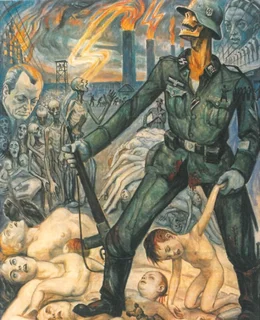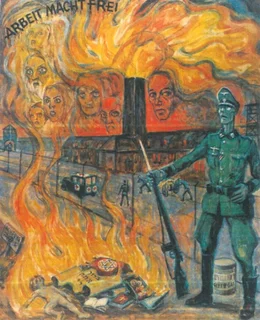For context, I previously watched his 7-hour long break down of the John F. Kennedy assassination, and while it was very convincing, I have not done much of my own in-depth research on that topic specifically so I can't speak to the accuracy of everything in it. The most interesting thing to me, outside of the assassination itself, was the first part of the documentary where he discussed how the CIA/OSS went about creating propaganda in the form of rumors. My first thought was to take this knowledge and apply it to other events and stories throughout the past one hundred years or so. Most notably, the Holocaust narrative is known to have sprung from rumors about large scale atrocities being committed by Germans against the Jews.
From what I understand, the official story is that the rumors of atrocities, specifically gassings, are said to have originated within the camps and made their way out to the public. The stories were then put into newspapers and other forms of media which led to Jews learning about these stories. This is why we see clips of survivors saying that when they were forced to take a shower upon arrival at a camp, they thought gas was going to come out and kill them and were pleasantly shocked when water came out instead.
I took the liberty of writing down the important aspects about rumors and how they are created that are outlined in the documentary via OSS documents. I underlined important points.
Based on these criteria, we can go through and show how the Holocaust narrative was crafted via rumors by intelligence. It's important to remember that intelligence's primary goal was to help win the war against Germany by any means possible, and usually that meant winning over public sentiment and trying to cause revolt against the government (just like we saw recently in the Israel-Iran conflict where Netanyahu was hoping the Iranian people would rise up against the Ayatollah). These rumors that were created also assisted the Zionists in their goal of creating a homeland, but I won't touch on that here.Rumors:
Definition (What is a rumor?):1. The successful rumor is easy to remember:
- The successful rumor is a simple, brief, concrete, and vivid story, purporting to come from inside sources and concerning persons and events familiar to all members of the group.
2. The successful rumor follows a stereotyped plot:
- It is sufficiently brief and simple to survive in memory of successive narrators
- It concerns familiar persons, places and circumstances, and incorporates suitable “local color”
- It contains striking concrete detail
- It often incorporates stereotype phrase or slogan
- It contains a humorous twist when possible
3. The successful rumor is a function of the momentary interests and circumstances of the group:
- Its plot recapitulates precedents and traditions in the history and folklore of the group
- It observes the peculiar national disposition of the group
- “It is the oldest story in the newest clothes”
4. The successful rumor exploits the emotions and sentiments of the group:
- It is provoked by and provides an interpretation or elaboration of some isolated current happening or event
- It serves to supply information which is needed to fill a knowledge gap
5. The successful rumor is challenging because:
- It expresses a widespread emotional disposition shared by members of the group
- It provides justification for suppressed fears, hatreds, or desires
- It serves to articulate a sentiment common to the group
Rumor Targets:
- It purports or appears to come from inside sources and usually has the character or “forbidden” information
- It is usually incapable of direct verification
- It is neither too plausible nor too implausible
- A successful rumor must take advantage of the state of mind of the people for whom it is intended. The general principles are:
Planning Rumor Work:
- Those people who are most eager for information about events which effect them are the best targets for rumors supplying such information
- People with fears, hopes, and hostilities stemming from their involvement in the war are affected most by rumors that feed on those feelings
- Planned lines of action against the enemy should include strategic themes for rumors
- To implement rumor suggestions stemming directly from these themes one or more of the following techniques can be used: Different rumors revealing the same “information”; planting the same rumor in different places; designing them so as to appear of independent origins; integrating them with black and white media.
For the 1st point, a lot of the early propaganda that was being pushed out was both humorous and detailed. There were ridiculous stories like roller coasters of death, masturbation machines, etc. These stories had a humorous twist in the sense that they were ridiculous, and the process for how they were killed in each story were very detailed.
The 2nd point discusses traditions and folklore of the group. The "group" in this case would be the Jews, and when we think about tradition and folklore we think about their religion and what might be symbolic in it. This is why we see the 6 million number as one of the pillars of the Holocaust. There was another thread on this forum recently about the 6 million fable and its religious significance (https://www.codohforum.com/viewtopic.php?t=412) so I won't go into that here. This number was seen in newspapers in the decades before the Holocaust, making it convenient to use for propaganda during and after the war.
The 4th point is the second most important one in my opinion. Essentially, it discussed how the rumor should exploit the emotions of the group. Most notably, the second bullet discusses that the rumor should provide justification for said emotions. Jews already had a negative sentiment towards Germans because they were being placed into ghettos/camps and discriminated against. To exploit and amplify the emotions of the group, intelligence started planting rumors about mass atrocities. It's joked about now how "Jews have been kicked out of all these countries, but they can never tell you why." Well, how would Jews be able to express their grievances against Germany without telling the truth? The answer is that they don't need to if they and others believe that they are being genocided. Nobody expects to hear justification for why your group is being killed on a large scale because such an act is unacceptable in nearly every circumstance. If people, especially German citizens, were to learn that the German government was supposedly coordinating a genocide, then it could potentially cause an uprising within the country and help the Allied war effort.
The 5th point on the list is the most important one since it relates directly to the gas chamber story. Throughout the war, and even during the Nuremberg Trials, there were reports and testimony of atrocities through electric chambers, steam chambers, and gas chambers. All of these rumors were believed to have come within the various camps and spread to the wider Jewish population. Let's look at the definition of a rumor again:
The bolded portion is the most important part when talking about these rumors of death chambers. These stories were very simple, vivid, and purported to come from inside the camps and made their way out to the press. Usually, they went along the lines of "X number of Jews have been slaughtered in gas chambers disguised as shower rooms at X camp." These stories were "incapable of direct verification." During the war, there was actually no way to verify that these atrocities were truly taking place. Nobody from the outside had access to these camps, and even those who did were unable to verify claims of gas chambers. Here is a thread about the Red Cross being unable to verify gas chamber claims (https://www.codohforum.com/viewtopic.php?t=100). However, the claim that Jews were being murdered in poison gas chambers is "neither too plausible nor too implausible." It's not totally out of the picture that Hitler and the Germans would systematically murder Jews since they had animosity towards them. For other reasons, such as need for labor and the use of expensive resources, systematic murder would be implausible for the Germans during a two-front war. The use of gas chambers also isn't a ridiculous way to kill a lot of people at one time, at least from a surface level perspective. For these reasons along with others, the gas chamber story is the one that made it to the other side of the war and is the one of the pillars of the Holocaust. The electric chamber, masturbation machines, baby head bashing, and other claims were too implausible and were totally incapable of direct verification, hence why they are seen as fake propaganda now.The successful rumor is a simple, brief, concrete, and vivid story, purporting to come from inside sources and concerning persons and events familiar to all members of the group.
The "Rumor Targets" section lays out which groups should be targeted by rumor and propaganda. The 4th point relates directly to the principles laid out here and I discussed that above. On a more general note, it's very important to understand how all of these aspects about rumor creation work together to create believable propaganda. I attempted to break down each point down on an individual level, but each aspect of the story is interconnected and work together to form the Holocaust narrative.
The "Planning Rumor Work" section describes the process in which rumors are actually created. I want to look at this more closely since it provides framework for a summary.
Throughout the war, rumors of different methods to commit mass atrocities were being reported on. The goal of these rumors was to give the impression that mass murder was taking place, regardless of how. The same rumors, specifically gas chambers, were being reported from different camps across Europe. These rumors seemingly came from independent origin from within the camps, or by some group/organization/government. The rumors were then put into various forms of media so people could see what was supposedly occurring.Planning Rumor Work:
- Planned lines of action against the enemy should include strategic themes for rumors
- To implement rumor suggestions stemming directly from these themes one or more of the following techniques can be used: Different rumors revealing the same “information”; planting the same rumor in different places; designing them so as to appear of independent origins; integrating them with black and white media.
Lastly, I think a lot of people who have a simple understanding of Holocaust revisionism, or are new to the topic, have the belief that Jews just made up these stories and people went along with it. This is not to say that Jews did not ever make up their own stories, rather they were greatly assisted by organized propaganda. I wanted to point this out to start a broader discussion on how the coordinated use of propaganda, specifically in the form of rumors, was used by intelligence to create the Holocaust narrative.

